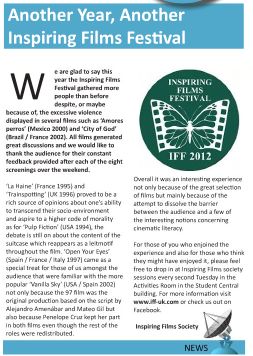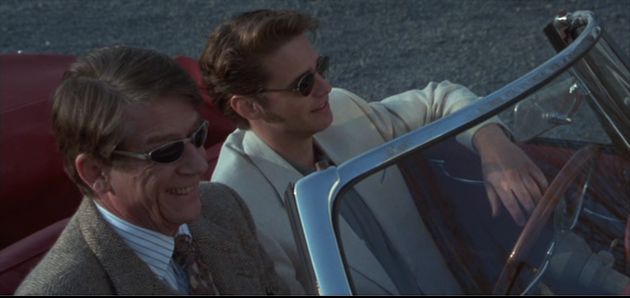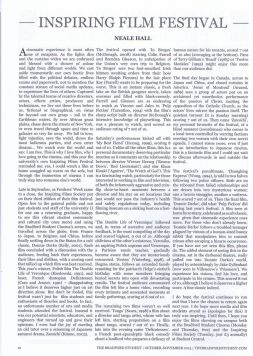IFF 2012

The goal of the Inspiring Films Festival (IFF) is to inspire you to passionate discussions about early work by talented directors who later made many more great films.
Contact: anna@iff-uk.com


Since arriving in Bradford, there has been so much for the students of Bradford to be engaged with. There have been many free film events, amongst all the partying and studying, including the Inspiring Films Festival recently held in Student Central, hosted by Ania Draniewicz. Beginning on the 30th September, there were ten screenings of films from around the globe, including France, Taiwan, Denmark and United Kingdom. Before the first film on Friday evening, Love and Death on Long Island (review below), Ania welcomed the audience and the director, Richard Kwietniowski, expressing hope that the films shown would inspire the local community, whether on a personal level or greater, to engage with film. Those who attended the festival certainly enjoyed listening to Richard Kwietniowski discuss his own inspiration for Love and Death on Long Island and his production adventure. If you enjoyed the Inspiring Films Festival, Ania’s World Film Salon will start on 22nd November in Gallery II exploring memory, place and storytelling.
Review: Love and Death on Long IslandLove and Death on Long Island, written and directed by Richard Kwietniowski and screened at the 1997 Cannes Film Festival, explores the entertaining, yet intuitive journey made by recently widowed best-selling author Giles De’Ath (John Hurt) as he discovers modern culture and technology, eventually becoming fixated with an American movie star, Ronnie Bostock (Jason Priestley). Love and Death on Long Island opens with a radio interview in which Giles, haphazardly and to stunning comic effect, misjudges character, painting him ignorant to an already ignorant modern society. His realisation results in an infatuation of consumer television, video rentals and Ronnie Bostock after accidentally wandering into a film screening of Hot Pants College II.

This film is of two halves; the first in Britain as Giles contextualises haute culture with popular culture, appreciating in constant comparative juxtaposition particular artworks with Ronnie Bostock’s performance in Hot Pants College II, until the second in which his unbearable obsession (by this stage, Giles has produced a teenage scrapbook compilation of Ronnie) takes Giles to Long Island wanting to declare his devotion. Of what follows, the performances from Priestley and Hurt shine an authentic chemistry and becomes rewarding for an audience who are constantly left panicking: this isn’t going to end well for Giles. It is this chemistry and astute directing that allows the final two lengthy scenes to remain intact. Love and Death on Long Island is a lengthy viewing but, even if it doesn’t sound like your cup of tea, I would still give it a go: you may be surprised.
The film festival continued over the weekend, presenting ten classics from around Europe and the world. After each film, a brief discussion followed and then voting where the audience could give their opinions of the films. Saturday began with Italian for Beginners (Lone Scherfig, 2000), a Danish romantic comedy produced using the austere principles of Dogme 95, follows several individuals, of whom all are single, to embark on a beginner’s course in Italian. The audience found it entertaining, emotive and convincing in style, enjoying the Dogme aspect. 9 out of 10.
The next two films were Three Colours: White (Krzysztof Kieślowski, 1994) and Run Lola Run (Tom Tykwer, 1998). White is the second in the Three Colours trilogy focusing on marital breakdown and the now-divorced husband’s attempt to restore equality to revenue. Those at the festival found it confusing, yet enjoyable with interesting cinematographic and narrative execution. 7 out of 10. Run Lola Run is a crime thriller where Lola, after receiving a phone call, has to find 100,000 marks within twenty minutes to save her boyfriend’s life. With its experimental style and edge of seat twists, the audience found it extremely creative with rewarding visuals and story. 8 out of 10.
The final two films for Saturday were Women on the Verge of a Nervous Breakdown (Pedro Almódovar, 1988) and Léon (Luc Besson, 1994). Women on the Verge of a Nervous Breakdown is a fast-paced black comedy nominated for Best Foreign Language Film in the 1988 Academy Awards about a woman whose lover leaves her and her attempt to find out why. The audience found it unique in comedic style with great dialogue and ‘outstanding portrayal of women’. 8 out of 10. Lastly, Léon stars Jean Reno, Gary Oldman and Natalie Portman, about a professional assassin reluctantly becoming the guardian and trainer to twelve-year-old Mathilda. The second most popular film with the audience, the cast, visuals and script were superb. 9 out of 10.
The final day of the Inspiring Films Festival dawned and began with Eat Drink Man Woman (Ang Lee, 1994). Ang Lee presents an interesting tale about a elderly chef who lives with his three daughters, one of whom finds her future plans changed by the life events of the others. Whilst it started slow, it was engaging and warming, with a distant documentary approach. The audience, including myself, didn’t quite understand the sudden use of static cameras during pivotal moments, but enjoyed the individual character perspectives. 8 out of 10.
The next two films were Y Tu Mamá También (Alfonso Cuaron, 2001) and Hero (Yimou Xiang, 2002). Y Tu Mamá También is about two teenage boys in Mexico embarking on a road trip with an attractive older woman. Whilst many of the audience found it too graphic, they found the filmmaking style intriguing; the narration and sound editing meant it become almost an exploration diary. 7 out of 10. Hero, an extremely well received film by the audience, is based on the assassination attempt on King of Qin, and was, at the time of release, the highest-grossing feature film in China. When an official defeats Qin’s principle enemies, he is summoned. The audience enjoyed the sound editing and ‘visually-stunning’ cinematography, liking in particular the colour representation. Some of the audience enjoyed it simply because Jet Li was in it! 8 out of 10.
With the Inspiring Films Festival almost over, there was just Fight Club (David Fincher, 1999) left. Simply put, Fight Club is about channelling male aggression as an insomniac office employee and a soap salesman build a global organisation. Starring Brad Pitt and Edward Norton, this is a personal favourite of mine. It’s critique on materialistic society which has become oblivious to many of its citizens. Whilst some of the audience commented on the natural changes that occur when transferring novel content to a film adaptation, they generally found the performances, story and direction truly fantastic, but not without leaving a few confused and dazed. 8 out of 10.
Taken from Bradford Students Cinema
